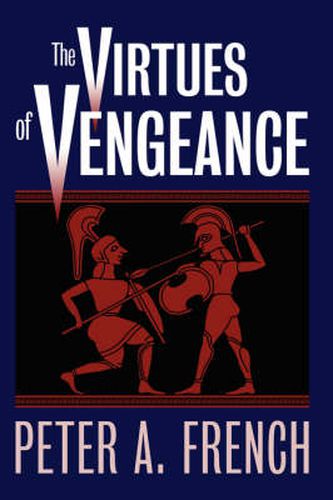Readings Newsletter
Become a Readings Member to make your shopping experience even easier.
Sign in or sign up for free!
You’re not far away from qualifying for FREE standard shipping within Australia
You’ve qualified for FREE standard shipping within Australia
The cart is loading…






This title is printed to order. This book may have been self-published. If so, we cannot guarantee the quality of the content. In the main most books will have gone through the editing process however some may not. We therefore suggest that you be aware of this before ordering this book. If in doubt check either the author or publisher’s details as we are unable to accept any returns unless they are faulty. Please contact us if you have any questions.
Although most moral philosophers reject vengeance as a barbaric sentiment, Peter French argues that it has fallen into disrepute without being seriously examined with respect to its real moral value. In beginning his philosophical examination of the virtues of vengeance, he investigates the use of vengeance themes in literature and popular culture. Literary works from the Iliad to Hamlet and modern film Westerns such as Clint Eastwood’s Unforgiven are reviewed in his exploration of the philosophical and ethical aspects of vengeance. He then concentrates on the conditions that could make acts of vengeance virtuous. Film Westerns play an illustrative role in French’s work because of their frequent use of the vengeance plot. As self-conscious morality plays, they seldom wander from an investigation of the social, psychological, political, and moral implications of revenge. French uses such classics as The Searchers and Winchester ‘73 to identify crucial philosophical elements of the concept of vengeance that are then examined in detail in later parts of the book. In the course of his study of vengeance as a moral concept, French exposes important distinctions between types of moral theories (karmic and non-karmic) and between people who are morally handicapped and those who are morally challenged. He examines concepts relevant to vengeance such as honor, moral authority, and evil, and issues such as the rationality of revenge and proportionality in punishment. French concludes that exiling vengeance to a dark corner of human action has robbed morality of one of its most potent and persuasive elements and that mere condemnation or ostracism are inadequate responses to heinous acts. The maintenance of the authority of morality often requires more hostile responses. His book challenges us to reconsider the value, indeed the virtue, of various responses to evil and may serve as a metaethical map of the conceptual geography of vengeance for those daring to explore what has generally been assumed in the literature of ethics to be forbidden territory.
$9.00 standard shipping within Australia
FREE standard shipping within Australia for orders over $100.00
Express & International shipping calculated at checkout
This title is printed to order. This book may have been self-published. If so, we cannot guarantee the quality of the content. In the main most books will have gone through the editing process however some may not. We therefore suggest that you be aware of this before ordering this book. If in doubt check either the author or publisher’s details as we are unable to accept any returns unless they are faulty. Please contact us if you have any questions.
Although most moral philosophers reject vengeance as a barbaric sentiment, Peter French argues that it has fallen into disrepute without being seriously examined with respect to its real moral value. In beginning his philosophical examination of the virtues of vengeance, he investigates the use of vengeance themes in literature and popular culture. Literary works from the Iliad to Hamlet and modern film Westerns such as Clint Eastwood’s Unforgiven are reviewed in his exploration of the philosophical and ethical aspects of vengeance. He then concentrates on the conditions that could make acts of vengeance virtuous. Film Westerns play an illustrative role in French’s work because of their frequent use of the vengeance plot. As self-conscious morality plays, they seldom wander from an investigation of the social, psychological, political, and moral implications of revenge. French uses such classics as The Searchers and Winchester ‘73 to identify crucial philosophical elements of the concept of vengeance that are then examined in detail in later parts of the book. In the course of his study of vengeance as a moral concept, French exposes important distinctions between types of moral theories (karmic and non-karmic) and between people who are morally handicapped and those who are morally challenged. He examines concepts relevant to vengeance such as honor, moral authority, and evil, and issues such as the rationality of revenge and proportionality in punishment. French concludes that exiling vengeance to a dark corner of human action has robbed morality of one of its most potent and persuasive elements and that mere condemnation or ostracism are inadequate responses to heinous acts. The maintenance of the authority of morality often requires more hostile responses. His book challenges us to reconsider the value, indeed the virtue, of various responses to evil and may serve as a metaethical map of the conceptual geography of vengeance for those daring to explore what has generally been assumed in the literature of ethics to be forbidden territory.